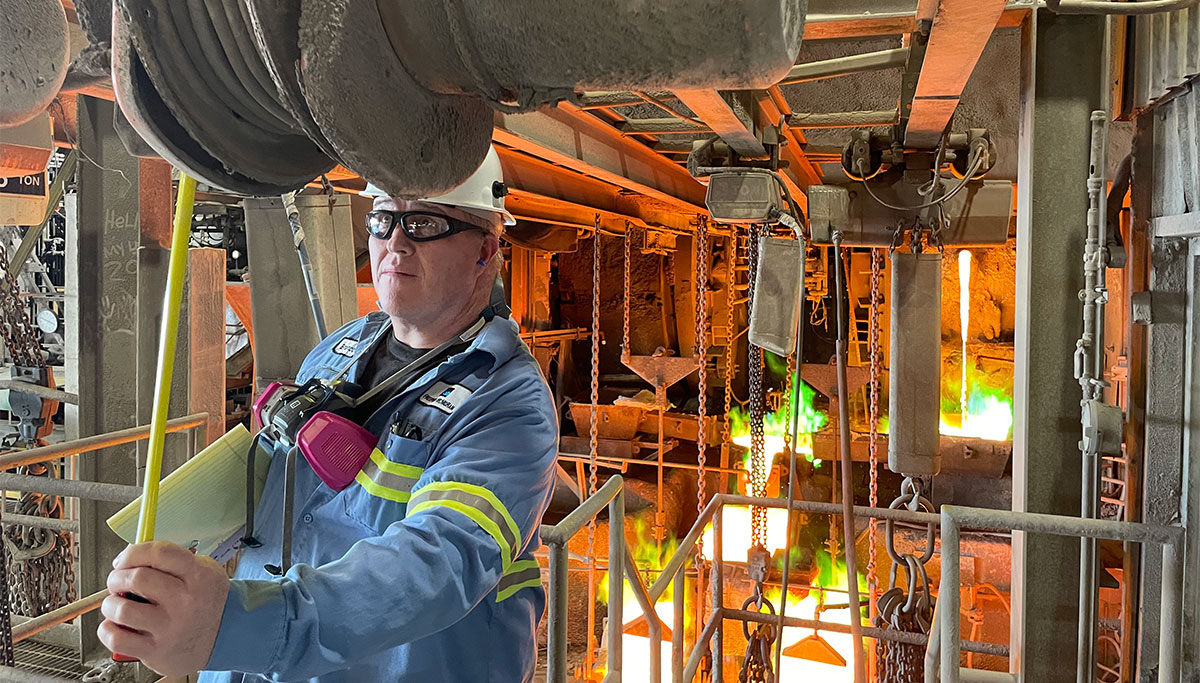VOL. 07 | ISSUE 4 | December 2024

Brandon Norcross, Planner II, checks equipment in the Miami smelter. Revised procedures have improved efficiency, reliability and safety while earning Miami an ISO 55001 certification for asset management.
New Procedures Improve Equipment Reliability, Safety and Efficiency at Miami Smelter
Brandon Norcross used to plan repair jobs at the Miami smelter complex from an office. Not anymore. Now he is out in the field, talking to the mechanics and technicians face-to-face and eyeballing the job before he builds the repair plan.
Norcross, Planner II, said getting out of the office and to the job site has made him more effective. He sees what needs to be fixed with his own eyes and can talk through the work with the people who will be doing it, rather than just relying on their notes.
“It has made the job much more effective,” Norcross said. “We do get out in the field, talk to the mechanics or technicians face-to-face, see what issues they’re having, what troubles they have. They tend to open up to you more once you are out in the field, talking with them, trying to help them figure out what would make the job go easier, better or just to trying to simplify it.”
The change in how Norcross and other planners do their jobs is part of a two-year process in Miami, Arizona, to revamp equipment operation and maintenance procedures to improve reliability and efficiency. The work paid off recently when Miami achieved Asset Management Systems certification from the International Organization for Standardization. That ISO 55001 certification is an industry standard for ensuring organizations effectively manage assets.
As part of that process, the role of planners was redefined. In the past, being a planner was an administrative office job responsible largely for scheduling work and ordering parts and supplies. Now, in addition to those duties, the planners go into the field and assess what needs fixing, identify all necessary parts, tools and supplies, find the specifications, and identify safety lockout points. Planners then prepare a kit with everything needed to complete the job that they give to the repair technician.
Beyond a better understanding of the job, working in the field integrates planners better into the maintenance team, Norcross said.
“It forms a sense of camaraderie with the team,” he said. “It helps you become one with them. They see you as a team member instead of just somebody pushing paper.”
The ISO certification is the result of a rigorous two-year process that involved changing how equipment is managed and maintained. The starting point was to integrate those standards with the company’s 2024 strategic themes of the Americas to drive improved equipment reliability through maintenance and execution to achieve greater asset efficiency.
From the beginning, front-line workers from both operations and maintenance were brought into discussions about why attaining ISO certification was important. Meeting ISO standards would make the assets at the smelter more reliable and thereby improve efficiency. That would result in fewer unplanned repairs and longer equipment life.
Tangible benefits for workers include fewer late-night callouts for emergency repairs, better bonus potential based on higher production and improved safety because the equipment is operating properly, said Larry Giannotti, Manager-Smelter Maintenance Services in Miami.
It has made the job much more effective. We do get out in the field, talk to the mechanics or technicians face-to-face, see what issues they’re having, what troubles they have. They tend to open up to you more once you are out in the field, talking with them, trying to help them figure out what would make the job go easier, better or just to trying to simplify it.
New procedures to monitor and maintain the equipment were developed. A criticality matrix was created to rank every piece of equipment in order of its importance to the operation. Maintenance and repair schedules were based on that.
The new site management plan aligns both with the ISO standards and the priorities laid out in the Maintenance and Reliability component of the strategic themes for the Americas, said Michael Cross, Manager-Downstream Operations in Miami.
“We are after the same thing in my mind,” Cross said. “The effort here put us on the fast track to getting those practices in place.”

One of the changes at Miami is that planners like Brandon Norcross now spend time in the field to help ensure technicians have everything they need when they start a repair job.
